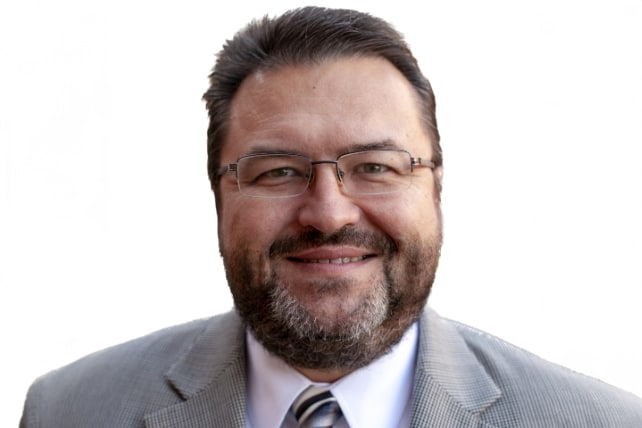Mission of Calvary University
Calvary University is an independent, nondenominational institution, providing undergraduate and graduate education which prepares Christians to live and serve in the church and in the world according to the biblical worldview. This is accomplished by providing educational curricula and a climate that fosters the development of intellectual and spiritual maturity, leadership potential, servanthood and a sense of mission.
The purpose of every program at Calvary is to teach students Bible and theology, and to prepare them for Christian ministry. Calvary’s educational programs emphasize biblical studies, complemented by general and professional education as well as practical field experience.
The Mission of the Ph.D. in Bible and Theology Program
The mission of the Ph.D. in Bible and Theology program is to produce outstanding students of the Bible in its original languages and theologians who can serve both the academy and the church as scholars who communicate their research in Biblical and theological studies.
Program Learning Outcomes (PLOs)
That the PhD students will be able to…
1.
Do exegetical research in the Hebrew Old Testament and the Greek New Testament.
2.
Synthesize the content and theology of each of the 66 books of the Bible.
3.
Explain and defend the Biblical worldview on various contemporary issues.
4.
Assess diverse theological views from the perspective of traditional dispensationalism.
5.
Advance Biblical and theological research and education by writing a Ph.D. dissertation.
Ph.D. Program Distinctives
- Dual discipline Ph.D. in Bible and Theology
- Built upon the Master of Arts in Bible and Theology program at Calvary University
- Hybrid of American model (course based with culminating research) and European model (research based) for Ph.D. studies
- 100% online courses. No residency requirements.
- Students take classes as a cohort
Calvary University Biblical and Theological Distinctives
- Biblical Inerrancy
- Consistent Literal Grammatical Historical Interpretation of the Bible
- Traditional Dispensationalism
- Biblical Young Earth Creationism
- Cessationist View of the Sign Gifts (Tongues, Healing, and Miracles)
- Complementarianism
- Pre-Tribulation Rapture of the Church
- Premillennial Second Coming of Christ to Earth
- Futurist Interpretation of the Book of Revelation
Calvary University has a fully accredited Ph.D. Program
March 7, 2018 – Accreditation by the Association for Biblical Higher Education (ABHE)
September 20, 2018 – Accreditation by the Higher Learning Commission (HLC)
Calvary University Ph.D. Fellowship Facebook Group
- Daily Dose of Hebrew
- Daily Dose of Greek
- Discussion of contemporary theological issues
- Links to resources for Ph.D. studies
- Opportunity to get to know other students and professors in the Ph.D. program
Admission Requirements to the Ph.D. Program
- Complete application on the Calvary University website with written personal testimony
- Pastoral reference
- Resume
- Possess a Master of Arts in Bible and Theology degree from Calvary University or equivalent from another Christian university or seminary
- Possess a Master of Divinity degree from Calvary University or equivalent from another Christian university or seminary
- Provide transcripts of all undergraduate and graduate work
- Provide a writing sample (research paper, journal article or book)
- Interview with the Ph.D. Program Director
Ph.D. COURSES AND DESCRIPTIONS
FIRST YEAR: BIBLICAL EXEGESIS
BT701 Advanced Hermeneutics and Theological Method
This course will study biblical hermeneutics focusing on the literal grammatical-historical method. Students will critique contemporary hermeneutical theories and theological systems from the perspective of traditional dispensationalism.
BT702 Ph.D. Dissertation Research Methods
This course will guide the student in research strategies, dissertation topic selection, employment of the correct form and style for dissertations, and the use of bibliographic resources, library materials, and computerized data bases. The student will write the Ph.D. dissertation proposal as the final project and present it to the class.
BT703 Exegesis in the Hebrew Old Testament
This course will equip students to do exegesis in the Hebrew Old Testament. Students will learn how to identify and solve exegetical problems in the different genre of the Hebrew Old Testament. Students will learn how to do discourse analysis and write exegetical outlines of different texts. Students will translate and analyze the Hebrew syntax of the book of Jonah.
BT704 Exegesis in the Greek New Testament
This course will equip students to do exegesis in the Greek New Testament. Students will learn how to do textual criticism and identify and solve exegetical problems in the different genre ofthe Greek New Testament. Students will translate and analyze the Greek syntax of the book of Ephesians.
BT705 Exegesis to Exposition
This course shows the student how to communicate biblical truth from sound exegesis. The course builds on exegesis in the Hebrew Old Testament and in the Greek New Testament. The goal of the course is to integrate exegesis and exposition. Students will write out exegetical outlines and expositions of Bible texts that reflect the arguments of the biblical authors. Students will evaluate contemporary Bible expositors and gain insights into becoming creative Bible teachers and preachers.
Portfolio Assessment at the End of First Year
The Ph.D. student will submit a portfolio to the Director of the Ph.D. program which includes: (1) one research paper, (2) a Ph.D. dissertation proposal, (3) a research strategy for the Ph.D. dissertation, and (4) a report on Ph.D. dissertation research progress.
SECOND YEAR: SYNTHESIS OF BIBLE BOOKS
BT706 Advanced Old Testament Synthesis I
This course examines the historical backgrounds, arguments, biblical theology and interpretive issues in the five books of the Torah (Genesis-Deuteronomy). Students will analyze the significance of the unconditional Abrahamic Covenant and the conditional Mosaic covenant. Students will do exegetical studies in the Hebrew text of these OT books.
BT707 Advanced Old Testament Synthesis II
This course examines the historical backgrounds, arguments, biblical theology, and interpretive issues in the Prophets section of the Hebrew Bible. Students will study the history of Israel in its Ancient Near Eastern context and see how God blessed and judged the nation of Israel based on their obedience or disobedience to the Mosaic covenant. Students will study the Messianic prophecies in these books and do exegetical studies in the Hebrew text of these Old Testament books.
BT708 Advanced Old Testament Synthesis III
This course examines the historical backgrounds, arguments, biblical theology, and interpretive issues in the Writings section of the Hebrew Bible. Students will study how these books relate to the post-exilic period of Israel’s history and how these books were used in the worship of God by Israel. Students will study the Messianic prophecies in these books and do exegetical studies in the Hebrew text of these Old Testament books.
BT709 Advanced New Testament Synthesis I
This course examines the historical backgrounds, arguments, biblical theology and interpretive issues of the four canonical gospels (Matthew, Mark, Luke and John) and the book of Acts. Students will critique the philosophy and methodology behind source criticism, form criticism and redaction criticism as related to the gospels. Students will do exegetical studies in the Greek text of these New Testament books.
BT710 Advanced New Testament Synthesis II
This course examines the historical backgrounds, arguments, biblical theology and interpretive issues of the epistles (Romans-Jude) and the book of Revelation. Students will do discourse analysis of the epistles and learn how they address specific theological and historical problems in the early church. Students will critique the idealist, historicist, preterist views of Revelation, and discover exegetical arguments for the futurist interpretation of the book of Revelation. Students will do exegetical studies in the Greek text of these New Testament books.
Portfolio Assessment at the End of Second Year
The Ph.D. student will submit a portfolio to the Ph.D. Director which includes: (1) a research paper, (2) a book review, and (3) a report on dissertation research progress. The Ph.D. student must receive a passing grade on the Hebrew Old Testament comprehensive exam and a passing grade on the Greek New Testament comprehensive exam.
THIRD YEAR: SYSTEMATIC THEOLOGY
BT711 Biblical Young Earth Creationism
This course focuses on the biblical and scientific evidence for biblical young earth creationism. Students will study a grammatical-historical interpretation of Genesis 1-11 and explain how the creation-fall-global flood events in history impact the study of astronomy, geology and biology. Students will critique the theory of evolution, evolutionary creation, progressive creation, the gap theory, and other views of origins and Genesis 1-2.
BT712 Advanced Theological Analysis I
This course will examine various views and issues concerning Prolegomena, Bibliology, Theology Proper and Angelology. Students will examine different systematic theologies looking at their systematization of doctrines in prolegomena. Students will explain and assess the various doctrinal positions on the inspiration and inerrancy of the Bible, the trinity, open theism, and spiritual warfare.
BT713 Biblical Archaeology and Historical Geography of Bible Lands
This course will examine the major archaeological discoveries that relate to the Bible. Students will evaluate problems in biblical archaeology and propose some possible solutions to these problems. Students will critique the arguments of biblical minimalists made against the historicity of the Bible. Students will examine the significance of the Dead Sea Scrolls and other ancient manuscripts that relate to the Bible. Students will study the historical geography of Bible lands and learn the historical significance of places mentioned in the Bible.
BT714 Advanced Theological Analysis II
This course will appraise various views and issues concerning Anthropology, Hamartiology, Christology, Soteriology and Pneumatology. Students will explain the significance of the church debates and doctrinal statements regarding these doctrines. The student will assess the theological differences and discuss the major arguments pro and con in the following debates: Calvinism vs. Arminianism, Free Grace vs. Lordship Salvation, Charismatic vs. Cessationism, and different views in the Historical Adam debate.
BT715 Advanced Theological Analysis III
This course focuses on the biblical doctrines of Israelology, Ecclesiology and Eschatology. Students will explain God’s program for Israel, the Church and the Nations from the Bible. Students will assess various views of the second coming of Christ (amillennialism, postmillennialism and premillennialism) as well as various views of the time of the rapture (pre-tribulation, mid-tribulation, pre-wrath and post-tribulation). Students will compare and contrast the eschatology of dispensationalism and covenant theology and examine how each theological position views Israel and the Church. Students will interpret the key biblical texts that explain the biblical covenants (Abrahamic, Mosaic, Davidic and New) and their fulfillment.
Portfolio Assessment at the End of the Third Year
The Ph.D. student will submit a portfolio at the end of the fourth year to the Ph.D. Director which includes: (1) research paper (2) book review and (3) a report on dissertation research progress. The Ph.D. student must receive a passing grade on the Systematic Theology comprehensive exam.
The Ph.D. student will then have an interview with the Ph.D. director prior to starting the dissertation research and writing classes.
The Ph.D. student will be considered a Ph.D. candidate after successfully completing the portfolio assessment at the end of the third year.
FOURTH YEAR – DISSERTATION RESEARCH, WRITING AND DEFENSE
The Ph.D. candidate will complete the dissertation in year four (year five or six if needed). A Ph.D. dissertation is a formal treatise around 50,000 to 75,000 words (about 300 double spaced pages excluding bibliography) that presents an argument for a thesis based on extensive scholarly research engaged during the first three years of the Ph.D. program.
The Ph.D. candidate will pay a $500 fee for each dissertation research and writing course that will pay for the services of the dissertation advisor and reader each eight weeks.
The Ph.D. candidate is required to complete the dissertation in three years from the date of approval to candidacy. (In special cases where additional research is required, a Ph.D. candidate may request approval for additional time by written request to the Program Director for review by the Ph.D. faculty.)
BT716 Dissertation Research and Writing I
The Ph.D. candidate will write the first 75 pages of the dissertation.
BT717 Dissertation Research and Writing II
The Ph.D. candidate will write pages 76-150 of the dissertation.
BT718 Dissertation Research and Writing III
The Ph.D. candidate will write pages 151-225 of the dissertation.
BT719 Dissertation Research and Writing IV
The Ph.D. candidate will write pages 226-300+ of the dissertation (including the conclusion and final bibliography).
BT720 Dissertation Lecture/Defense
The Ph.D. candidate will give a one hour lecture on his Ph.D. dissertation at Calvary University at a set time determined by the Ph.D. Director and agreed to by the Ph.D. candidate. The Ph.D. candidate will then defend his dissertation. The advisor, reader and Ph.D. Director will have one hour to ask questions about the dissertation.
Tuition & Fees 2025-2026
| On-Campus Courses | $505 per credit |
| Online Courses | $538 per credit |
| Student Services Fee | $262 per 8-week session |
| Dissertation Reader’s Fee | $567 |
| Dissertation Fee (per continuation / if needed) | $567 |
Enrollment Fee (one time) = $100
Late Registration Fee (per occurrence) = $225
Program Requirements
- Pastoral and personal references
- Resume
- Possess a Master of Arts in Bible and Theology, a Master of Divinity, or a Master of Theology with a minimum GPA of 3.0 on a 4.0 scale
- Provide transcripts for all undergraduate and graduate work
- Pass proficiency examinations in Hebrew and Greek or take Biblical language classes
- Provide a writing sample (research paper, journal article, book, etc.)
- Oral interview with the program director
- Graduation Fee: $175
Program Director
Dr. Gary Gromacki
B.A. (Pre-Seminary Bible and Greek) Cedarville University (1980)
Th.M. (Bible Exposition) Dallas Theological Seminary (1984)
D.Min. (Pastoral Leadership) Dallas Theological Seminary (1997)
Ph.D. (Biblical Studies) Baptist Bible Seminary (2006)

Dr. Gary Gromacki
Department Chair of Bible and Theology, Director of the Ph.D. in Bible and Theology Program, Director of the Master of Arts in Bible and Theology Program, Professor of Bible and Theology
Leadership & Faculty



Dr. Gary Gromacki, Th.M., D.Min., Ph.D.
Department Chair of Bible and Theology, Director of the Ph.D. in Bible and Theology Program, Director of the Master of Arts in Bible and Theology Program, Professor of Bible and Theology
View Profile








